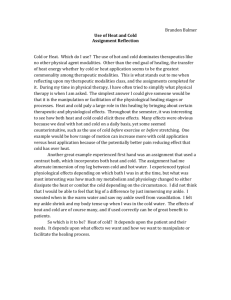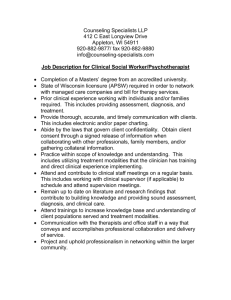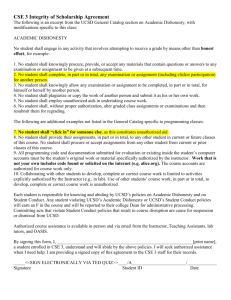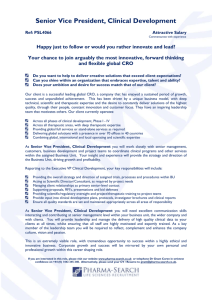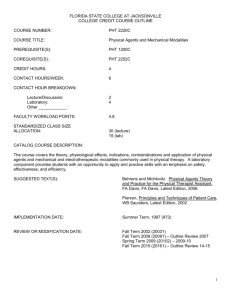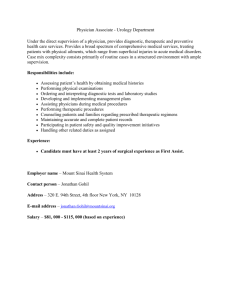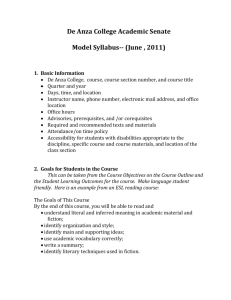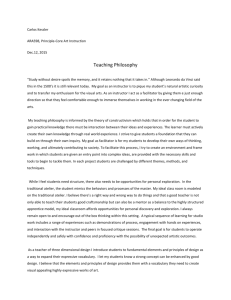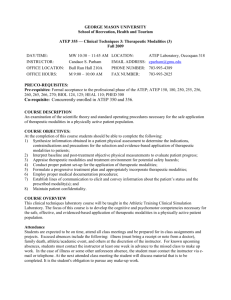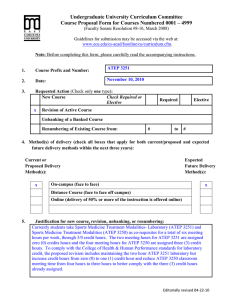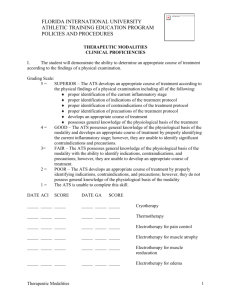Course Syllabus - ONID - Oregon State University
advertisement
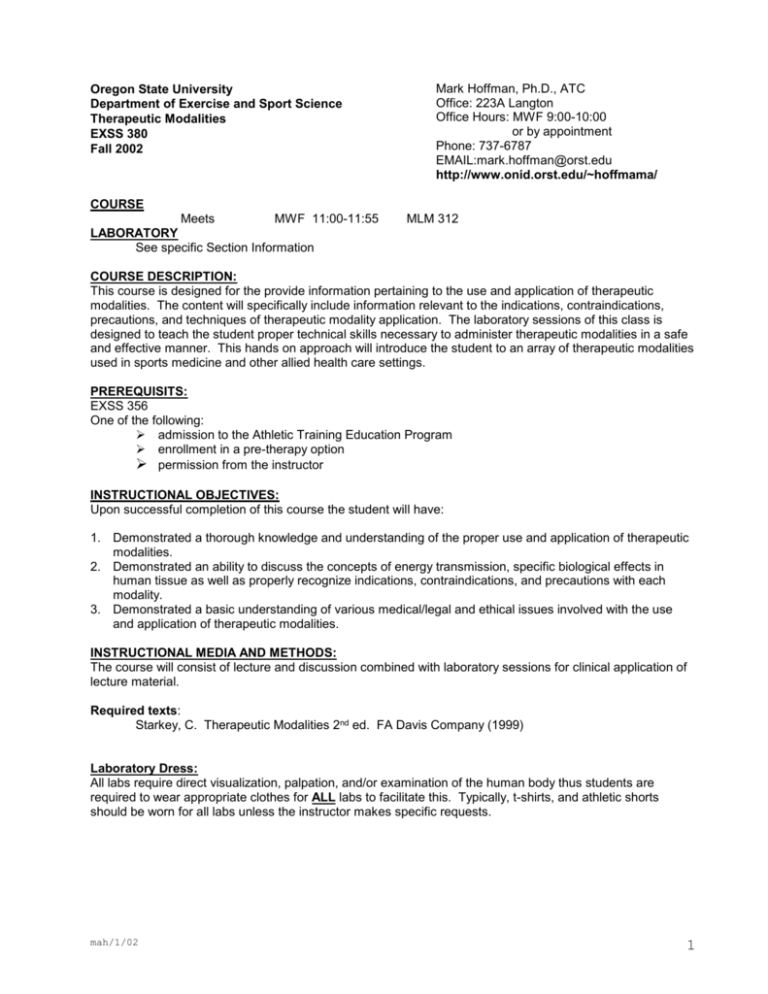
Oregon State University Department of Exercise and Sport Science Therapeutic Modalities EXSS 380 Fall 2002 Mark Hoffman, Ph.D., ATC Office: 223A Langton Office Hours: MWF 9:00-10:00 or by appointment Phone: 737-6787 EMAIL:mark.hoffman@orst.edu http://www.onid.orst.edu/~hoffmama/ COURSE Meets MWF 11:00-11:55 LABORATORY See specific Section Information MLM 312 COURSE DESCRIPTION: This course is designed for the provide information pertaining to the use and application of therapeutic modalities. The content will specifically include information relevant to the indications, contraindications, precautions, and techniques of therapeutic modality application. The laboratory sessions of this class is designed to teach the student proper technical skills necessary to administer therapeutic modalities in a safe and effective manner. This hands on approach will introduce the student to an array of therapeutic modalities used in sports medicine and other allied health care settings. PREREQUISITS: EXSS 356 One of the following: admission to the Athletic Training Education Program enrollment in a pre-therapy option permission from the instructor INSTRUCTIONAL OBJECTIVES: Upon successful completion of this course the student will have: 1. Demonstrated a thorough knowledge and understanding of the proper use and application of therapeutic modalities. 2. Demonstrated an ability to discuss the concepts of energy transmission, specific biological effects in human tissue as well as properly recognize indications, contraindications, and precautions with each modality. 3. Demonstrated a basic understanding of various medical/legal and ethical issues involved with the use and application of therapeutic modalities. INSTRUCTIONAL MEDIA AND METHODS: The course will consist of lecture and discussion combined with laboratory sessions for clinical application of lecture material. Required texts: Starkey, C. Therapeutic Modalities 2nd ed. FA Davis Company (1999) Laboratory Dress: All labs require direct visualization, palpation, and/or examination of the human body thus students are required to wear appropriate clothes for ALL labs to facilitate this. Typically, t-shirts, and athletic shorts should be worn for all labs unless the instructor makes specific requests. mah/1/02 1 Important Dates Midterm Examination Final Examination Friday, January, 18 Friday, February, 1 Week of Feb 4 (tentatively February 6) Friday, February, 15 Friday, March 1 Monday, March 18, 1800 Evaluative Procedures: Announced quizzes Lab Midterm Written Exam Final Written Exam 25% 25% 25% 25% Grading Procedure: Final grades will be based on the percentage of total possible points accumulated over the course of the term. From OSU Schedule of Classes ”The grading system consists of twelve basic grades, A, A-, B+, B, B-, C+, C., C-, D+, D, D- and F. A denotes exceptional accomplishment; B, superior; C, average; D, inferior; F, failure.” A AB+ B BC+ Percentage of total points 93-100 90-92 87-89 83-86 80-82 77-79 C CD+ D DF Percentage of total points 73-76 70-72 67-69 63-66 60-62 <60 COURSE POLICIES 1. Exams and quizzes will be taken at the assigned time. Make-up exams are not allowed unless the student obtains permission from the professor PRIOR to the beginning of the exam or under serious and compelling reasons. 2. For a student to receive points after the class review of an exam, the student must be present during the class’s review of the exam. 3. If a quiz is missed due to lateness or absenteeism, students will not be given an opportunity to makeup the lost points. 4. Appeals on grading will only be considered by the instructor within the first two weeks after the examination. 5. Make-ups must be taken prior to the beginning of the next class session . If the professor is not notified prior to the time of the exam, a make-up exam will not be allowed and the student will receive a grade of “F” (0 points) for that exam. 6. The University drop policy will be strictly followed. 7. Lecture attendance is not mandatory but is strongly encouraged. 8. A grade of incomplete will only be given under special circumstances and all university requirements for an incomplete must be met. Incompletes will not be given based solely on poor performance. 9. Academic dishonesty will not be tolerated and will be handled according to University policy (see below). mah/1/02 2 Dropping or Withdrawing. All university dates and procedures will be followed. Students with Disabilities Students with documented disabilities who may need accommodations, who have any emergency medial information the instructor should know of, or who need special arrangements in the event of evacuation, should make an appointment with the instructor as early as possible, no later than the first week of the term. Academic Dishonesty Academic Dishonesty is defined as: An intentional act of deception in which a student seeks to claim credit for the work or effort of another person or uses unauthorized materials or fabricated information in any academic work. Students are expected to be honest and ethical in their academic work. Academic dishonesty includes: CHEATING- use or attempted use of unauthorized materials, information or study aids OR an act of deceit by which a student attempts to misrepresent mastery of academic effort or information. This includes unauthorized copying or collaboration on a test or assignment or using prohibited materials and texts. FABRICATION- falsification or invention of any information (including falsifying research, inventing or exaggerating data and listing incorrect or fictitious references. ASSISTING- helping another commit an act of academic dishonesty. This includes paying or bribing someone to acquire a test or assignment, changing someone's grades or academic records, or taking a test/doing an assignment for someone else (or allowing someone to do these things for you). TAMPERING- altering or interfering with evaluation instruments and documents. PLAGIARISM- representing the words or ideas of another person as one's own OR presenting someone else's words, ideas, artistry or data as one's own. This includes copying another person's work (including unpublished material) without appropriate referencing, presenting someone else's opinions and theories as one's own, or working jointly on a project, then submitting it as one's own. The complete Academic Dishonesty Policy can be found at http://osu.orst.edu/admin/stucon/achon.htm. It is the responsibility of the student to be aware and understand these policies. Week 1 2 3 4 5 6 7 8 9 10 mah/1/02 LEC Topic Injury Response Process Pain, Treatment Protocol Thermal Thermal Test Electrical Electrical US US Mechanical Chapter 1 2-3 4 4 5 5 6 6 7 3
